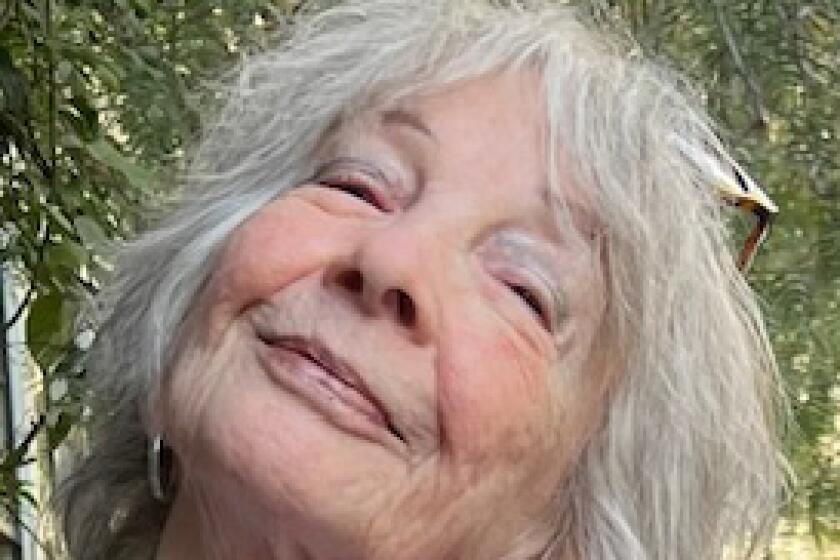Book Mark
The notorious Crips and Bloods gangs of South-Central Los Angeles exert a powerful hold on their members. Faro, 17 and homeless, spoke of his life with the author during a ride around the city. An excerpt.
He is wearing shabby sweats and busted-down Nike high-tops. He is very thin; the bones of his wrists sticks knobbily out of the elastic cuffs of his hooded jacket, which is at least two sizes too small for him.
We ride in silence for a while, and then I ask him about his family. It takes him a long time to answer, and when he does, his voice is soft, controlled.
“My mother, she died from a drug overdose. I got a grandmother, but she gonna go the same way--she just wanderin’ the streets day and night, lookin’ for handouts so she can fix herself a pipe. My brother got killed in a holdup three years ago.”
I ask which end of the gun his brother was at, and Faro looks at me in surprise. It is the first time we have made any kind of eye contact. He has 60-year-old eyes set down in that 17-year-old face. Graveyard eyes.
“Most people think he was holdin’ the gun.” He almost smiles; it is a pained expression. “He wasn’t but eight years old. He was lookin’ at comic books in a 7-Eleven and some dude come in to rob the place.” He turns away to look out the window. “The homies give him a nice funeral. I used to have a picture of him, laid out, in my scrapbook. It got lost.”
As we come to a stoplight, a Mustang convertible pulls up on Faro’s side of the car. The driver and the guy in the passenger seat are both young, both black. Their haircuts, called “fades,” are highly styled, carefully constructed flattops with geometric designs etched into the closely shaven sides.
“See them two dudes?” Faro’s voice, unaccountably, has dropped to a whisper. I nod my head.
“I’m gonna look crazy at ‘em. You watch what they do.” He turns away from me, and I lean forward over the wheel so that I can watch the faces on the two guys. The driver, sensing that someone is looking at him, glances over at my car. His eyes connect with Faro’s, widen for an instant. Then he breaks the contact, looks down, looks away. And there is no mistaking what I saw there in his eyes: It was fear. Whatever he saw in Faro’s face, he wasn’t about to mess with it.
Faro giggles and turns back toward me. He looks the same as he did before to me: a skinny, slightly goofy-looking kid. The light changes and the Mustang speeds away, turning right at the next corner. I ask Faro to “look crazy” for me. He simply narrows his eyes. That’s all. He narrows his eyes, and he looks straight at me and everything about his face shifts and changes, as if by some trick of time-lapse photography. It becomes a nightmare face, and it is a scary thing to see. It tells you that if you return his stare, if you challenge this kid, you’d better be ready to stand your ground. His look tells you that he doesn’t care about anything, not your life and not his.
I ask Faro what would have happened if the guy had looked crazy back.
“Then we woulda got into it.”
“With me sitting here next to you? Are you kidding?” I can hear an edge of shrillness in my voice.
He laughs softly. “Never woulda happened. That was just some damn preppy out on his lunch hour.”
But if he had returned the challenge. What then?
“Then I woulda killed him.”
My eyes slide over his skinny silhouette. No way can he be hiding a weapon under that sweatsuit. He smiles slyly and pats the top of his right shoe. I peer down and there, unbelievably, is the glint of metal. I look up at Faro’s face, and without knowing why, I’m shocked. I feel as if he has betrayed me, and it makes me angry.
“What you expect? This ain’t no game.” He is disgusted.
“You played a game with that guy, though, didn’t you? That whole thing was a game.”
“And what kinda game you playin’, lady? You come on down here, and you ask a whole lotta questions, and then when it get too real fo’ you, you start in hollerin’ like somebody dis’ed you.” Cold, icy anger in his voice. His eyes are narrowed again; this time it’s for real. I want to meet the challenge, I want to defend myself, but what he’s saying is true. I got mad when it got too real.
“You’re right, you know.”
“Ye-eeeeeh.”
“I get scared. And then I guess I get mad.”
“Be like that with me sometime, too.” We are both beginning to relax again.
“So I can ask questions again.”
“Ye-eeeeeh.”
Later he places the tip of one index finger on the glass next to him and taps it in a nervous, rhythmic beat. “That’s a crazy world out there, and we livin’ in it?”
“Dying in it, too.”
The finger stops tapping.
“If you die, you die. Most gangbangers don’t have nothin’ to live for no more, anyway. That why some of ‘em be gangbangin’.”
He seems to sense what it is that I’m thinking.
“I ain’t just talkin’ ‘bout myself, either. I’m talkin’ for a lotta gangbangers. They mothers smokin’ dope. Or somebody shot somebody else’s mother, and that person figure if they gangbang, they got a chance to get ‘em back.” He is silent again for a beat or two. Then, “People don’t have nothin’ to live for if they mother dead, they brother dead, they sister dead. What else they got to live for? If people in yo’ family is just dyin’, if the person you love the most, the person who love you the most be dead, then what else do you got to live for?”
“Yourself.”
It’s as if I hadn’t spoken; he doesn’t even hear me.
“I tell you this -- you see enough dying’, then you be ready to die yourself, just so you don’t have to see no more death.”
L e on Bing has written cover stories on gang life for L.A. Weekly and Harper’s magazine. She lives in Pasadena.
1991, by Leon Bing. Reprinted with permission from HarperCollins.
* Book Review: “Do or Die,” by Leon Bing, is reviewed on Page 1 of today’s Book Review section.
More to Read
Sign up for our Book Club newsletter
Get the latest news, events and more from the Los Angeles Times Book Club, and help us get L.A. reading and talking.
You may occasionally receive promotional content from the Los Angeles Times.






